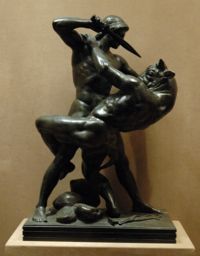Theseus: Difference between revisions
imported>Stephen Ewen (→Birth) |
imported>José Leonardo Andrade No edit summary |
||
| Line 10: | Line 10: | ||
Theseus was born and raised in Troizen and had as tutor a man named Connidas, to whom the Athenians used to sacrifice a [[ram]] the day before the feast of Theseus was held. As a teenager, Theseus followed the tradition of traveling to Delphi to offer his hair to the god. However, he clipped only the fore part of his head, imitating the [[Abantes]], a fierce people mentioned by [[Homer]] in the ''[[Iliad]]''. | Theseus was born and raised in Troizen and had as tutor a man named Connidas, to whom the Athenians used to sacrifice a [[ram]] the day before the feast of Theseus was held. As a teenager, Theseus followed the tradition of traveling to Delphi to offer his hair to the god. However, he clipped only the fore part of his head, imitating the [[Abantes]], a fierce people mentioned by [[Homer]] in the ''[[Iliad]]''. | ||
== Journey to Athens and labors == | |||
When Theseus reached the age of sixteen, his mother decided to reveal the identity of his father and took him where the rock was, which he easily lifted, recovering the sword and the sandals. It was now time for him to travel to Athens, a journey Aegeus had advice he should take in secrecy because he feared that the [[Pallantides]], his fifty nephews, might harm him before he arrived at Athens. Although his mother and grandfather begged him to take the safer sea route to Athens he decided to travel by the [[Peloponnesus]], which was at that time infested with murderers and robbers. | |||
== External link == | == External link == | ||
Revision as of 04:49, 28 September 2007
Theseus was a hero from Greek mythology and a legendary king of Athens.
Birth
There were two versions concerning the identity of the father of Theseus: one makes him son of the Athenian king Aegeus, while another presents him as the child of the god Poseidon. In both cases his mother is the princess Aethra.
According to the myth, king Aegeus had unsuccessfully tried to have children, so he decided to consult the oracle of the god Apollo at Delphi to find an answer to his problem. The oracle, known for its enigmatic answers, advised him not to "loosen the wineskin's jutting foot" before he arrived at Athens. This wasn’t a warning against alcohol, but against sex. Ignoring the true meaning of the words, Aegeus visited Pittheus, king of Troizen, who laid him with his daughter Aethra. It was also said that on the same night Aethra had sexual intercourse with Aegeus, she traveled to an island to offer a sacrifice, where she was raped by Poseidon and became pregnant with his child.
When Aegeus learn that Aethra was pregnant with his child, he decided to hide a sword and a pair of sandals underneath a rock. Secretly, he instructed Aethra that if she gave birth to a boy, she should tell him, when he was strong enough, to lift the rock and recover the hidden items. Aethra should then send him to Athens with the tokens and there Aegeus would acknowledge him as his son and heir.
Theseus was born and raised in Troizen and had as tutor a man named Connidas, to whom the Athenians used to sacrifice a ram the day before the feast of Theseus was held. As a teenager, Theseus followed the tradition of traveling to Delphi to offer his hair to the god. However, he clipped only the fore part of his head, imitating the Abantes, a fierce people mentioned by Homer in the Iliad.
Journey to Athens and labors
When Theseus reached the age of sixteen, his mother decided to reveal the identity of his father and took him where the rock was, which he easily lifted, recovering the sword and the sandals. It was now time for him to travel to Athens, a journey Aegeus had advice he should take in secrecy because he feared that the Pallantides, his fifty nephews, might harm him before he arrived at Athens. Although his mother and grandfather begged him to take the safer sea route to Athens he decided to travel by the Peloponnesus, which was at that time infested with murderers and robbers.
